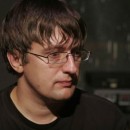What do you think of the current state of contemporary drama in Russia? Are there any identifiable trends?
Everything is fine. It’s hardly stagnating is it, so why worry?
What gave rise to the idea for your play Tityus The Irreproachable?
A few years ago the Royal Courttogether with the RSCapproached a group of Russian and Ukrainian writers to create plays for the main stage. The conditions were to not think about the practicalities of “real” theatre, to embrace the fantastic and write about what troubles you. I wanted to write a play about modern day Ukraine. As a sort of inspiration I took Shakespeare’s Titus Andronicus. I just love the play. I don’t understand those who doubt that Shakespeare wrote it or think it is a weak play. It’s a truly great play that has no chance of being popular today. I did an experiment with my friends and we watched the brilliant film Titus with Anthony Hopkins. Not one of them managed to watch to the end. A play based onUkraine didn’t work out in the end. Instead it’s about how humanity lies defenceless before each one of us. In an intellectual sense you could say it was a total failure!
Judging by this play you believe more in the continuation of scientific development than you do in the moral advancement of human beings. Do you think the more powerful technology becomes the more primitive we become?
Really, I was writing about how further scientific and technological advancement will necessarily bring about a conflict with the human being. And our moral degradation is an unavoidable process. We are becoming more simple so as to avoid perishing at the terrible ideas that are being born in the minds of nasty young men. All religions and all technology strive to that end. Nevertheless there are always more and more dangerous minds simply because the population is increasing. There are no limits to progress and I see no limit to our simplification. Yet we’ll still witness some heroic moral acts.
You said, seven years ago in an interview with Izvestiya that the situation for playwrights was positive – and gives playwrights reason to be optimistic. Would you say the same thing today?
Yes, I was wrong. This is just the beginning.
What are you working on at the moment?
I wrote a play about Martin Luther. It turned out to be awful, worse than John Osborne’s. I’d like to start afresh with it.
What do you think about a festival of contemporary Russian theatre taking place in the UK?
It’s good, it will test the soundness of our work. I think the first festival of this type is important but more important will be the second.
Do you follow the output of British playwrights? Are there any parallels between new British and Russian drama?
British playwrights are the strongest in the world. English drama justifies this profession. We have learnt a lot from them and will continue to do so. There are tonnes of parallels, enough for a dissertation!


